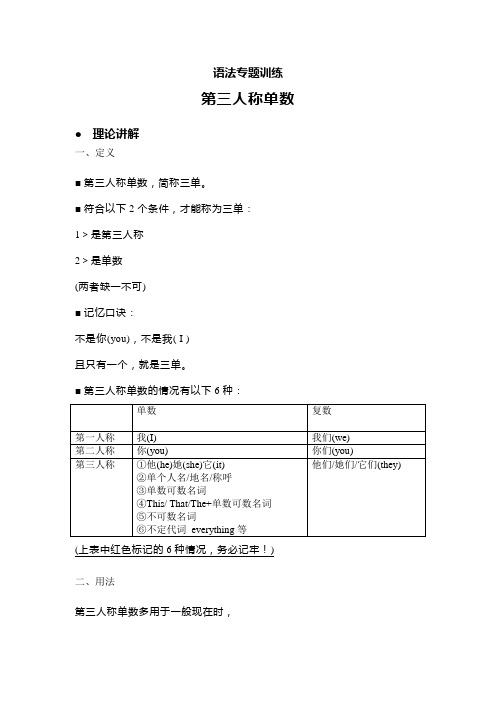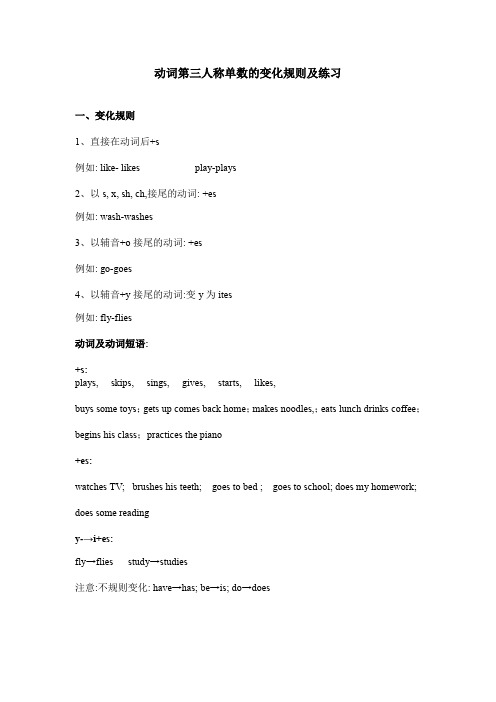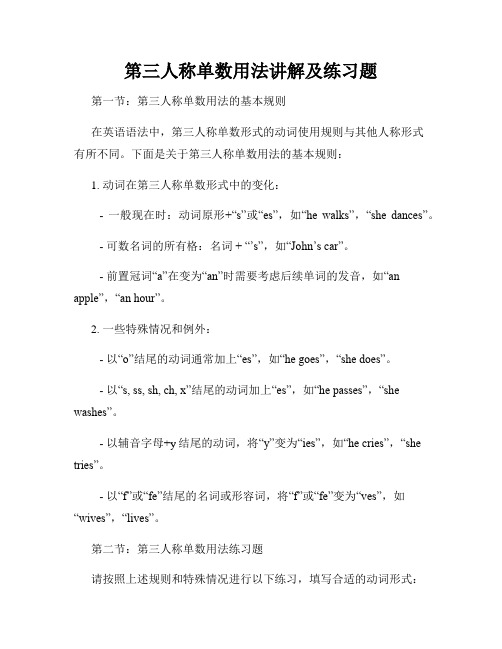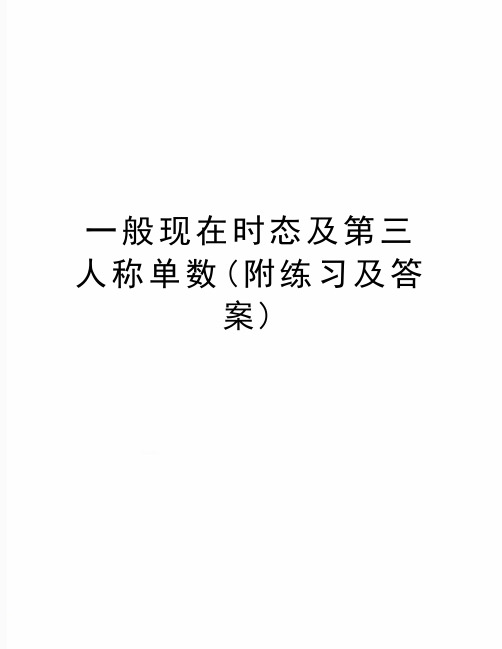第三人称单数 讲解及练习
人称代词物主代词和第三人称单数的讲解以及练习

人称代词和物主代词一、人称代词表示“我”、“你”、“他”、“她”、“它”、“我们”、“你们”、“他们”的词,叫做人称代词。
人称代词有人称、数和格的变化,见下表:(1)人称代词主格:作主语,表示谁怎么样了、干什么了。
如:I am a teacher. You are student. He is a student, too. We / You / They are students.(2)人称代词宾格作宾语,表示动作行为的对象。
如:Give it to me. Let’s go (let’s =let us)二、物主代词表示所有关系的代词叫做物主代词,也可叫做代词所有格。
物主代词分形容词性物主代词和名词性物主代词二种,其人称和数的变化见下表。
(1) 形容词性物主代词( my / your / his / her / its / our / their )+名词。
如:her book my teacher his bike(2)名词性物主代词则相当于“形容词性物主代词+名词”,故其后不必加名词。
如:Is this your book?No,,it isn’t, it’s hers(her book)人称单数复数主格宾格 主格 宾格 第一人称 I me we us 第二人称you you youyou第三人称hehim theythemshe her itit 数、人称、类别单 数复 数第一人称第二人称第三人称 第一人称 第二人称 第三人称 形容词性物主代词 myyourhisheritsouryourtheir名词性物主代词mineyourshishersitsoursyourstheirsThis pen is mine.人称代词与物主代词用法的练习题一、填表二、填空:1.Let _____ (I) help ____ (you).2.Let _____ (we) go.3.(I) _____ are students.4.I can't find _____ (they).5.Give ____ (he) the book. 三、选择1.________are in the same class.A.Her and meB.She and lC.Me and herD.l and she 2.Please call ___ at 256-5896 A me B my C I D mine 3.-Do you like these computers? -No,I don't like_______. A it B them C they5.Our tercher think_______are right. A.We C it D she6.______go to the party.A.He,I and youB.I, you and heC.You,I and heD.You,he and I 四、用括号中的适当形式填空: (1)Are these ________(you )pencils?Yes, they are ________(our ).人称单数复数主格宾格 主格 宾格 第一人称 I we 第二人称you youyou第三人称him theyshe it(2)—Whose is this pencil?—It’s ________(I).(3)I love ________(they)very much.(4)She is________(I)classmate.五、代词练习:A. 写出各个代词的对应项。
完整版)小学动词第三人称单数讲解及练习

完整版)小学动词第三人称单数讲解及练习一般现在时是指在现在发生的动作或状态。
它有三个基本用法:1.描述事物或人的特征和状态,例如“天空是蓝色的”。
2.表示经常性或惯性的动作,例如“我每天六点起床”。
3.描述客观现实,例如“地球绕着太阳转”。
在一般现在时中,当主语是第三人称单数时,谓语动词要用第三人称单数形式,即常在动词原形后加-s或-es。
常见的时间状语有always,every week (day。
year。
month…),once a week,every…,sometimes,at…,on Sunday,usually,often,never,hardly等。
主语可以是人称代词he。
she。
it,单个人名、地名或称呼,单数可数名词或“this / that / the+单数可数名词”,以及不定代词someone。
somebody。
nobody。
everything。
something等及指示代词this。
that。
例如,“他喜欢看电视”、“XXX看起来像她的母亲”、“马是有用的动物”、“这本书是你的”、“这只猫是XXX的”、“大家到齐了”、“这块手表有毛病”、“这是一支钢笔”。
④This is an eraser.XXX is used as the subject。
it takes the third person singular form。
For example:①The milk is in the glass.②The bread is very small.When a number or letter is used as the subject。
it is treated as third person XXX:①"6" XXX.②"I" XXX.The rule for adding -s or -es to verbs in the third person singular form is as follows:1.In general。
中考英语复习语法专题- 动词第三人称单数讲解及练习

语法专题训练第三人称单数理论讲解一、定义(上表中红色标记的6种情况,务必记牢!) 二、用法第三人称单数多用于一般现在时,当主语符合第三人称单数时,动词也要变成第三人称单数形式。
即:主语三单,动词三单。
如:They often play football on Sundays.(主语They不符合三单,动词用原形)She often plays football on Sundays.(主语She符合三单,动词用三单形式)Lucy and I often go running on Sundays.(主语Lucy and I 不符合三单,动词用原形)Lucy often goes running on Sundays.(主语Lucy符合三单,动词用三单形式)三、动词三单变化■动词三单的规则变化:1>一般情况下,词尾直接加-s如:look-looks want-wants2>以s、x、o、ch、sh结尾,加-es如:go-goes watch-watches3>以辅音字母+y 结尾,变y为i , 加-es如:fly-flies study-studies■动词三单的不规则变化如:have-has实践练习一、判断下列主语是否符合三单。
符合写T,否则写F。
( )1. My parents( )3. Mr Wang( )5. Tom( )7. They( )9. This dog( )2. He( )4. Everything( )6. Those ships( )8. The meat( )10. Her aunt( )11. The elephant ( )13. Three eggs( )15. Children’s Day ( )17. Peter and his family ( )19.The ugly duckling ( )21. Mother Duck ( )23. The plant( )25. The people( )27. The sun( )29. These grapes ( )31. Her mother ( )33. The girl( )35. The second pea( )37. The weather( )39. Father Christmas ( )41. Peter’s nose( )12. Children( )14. Joe’s favorite story ( )16. Kitty and Alice( )18. The underground station ( )20. The photo of my family ( )22. Different roads( )24. Some animals( )26. Many interesting stories ( )28. A pair of shoes( )30. Your school( )32. All our books( )34. students( )36. Our house( )38. A lot of shops( )40. Mr. Green and Mr. Smith ( )42. Kitty’s little brother二、写出下列动词的三单形式。
第三人称单数讲解及练习

大家都知道,在一般现在时中,当主语是第三人称单数
时,谓语动词要用第三人称单数形式,即常在动词原形 后加-s或-es。但有些同学们对于哪些主语是第三人称 单数还不十分清楚,现归纳总结如下:
一、人称代词he, she, it是第三人称单数。如: He likes watching TV. 他喜欢看电视。 She has lunch at twelve. 她十二点吃午餐。 It looks like a cat. 它看起来像只猫。
动词单三的练习 一. 根据括号里单词的适当形式填空 1. She _____ (be ) a writer. 2. It _(look) like a monkey. 3. We_____(go) to the park. 4. He _____(go) to school. 5. Amy_____(like) eating fruits. 6. Hebei_____(be) next to Shandong. 7. Our teacher _____(be) talking with John. 8. Whose book _____(be) this ? 9. Dogs _____(be) our friends . 10. That blackboard _____(be) clean.
第三人称单数形式的构成
1.一般直接在词尾加 s, 如:want-wants likelikes read-reads play-plays eat-eats 2.以s,x,ch ,sh等结尾的单词加 es , 如: watchwatches teach-teaches miss-misses fix-fixes 4.以辅音字母加o结尾的单词,加 es 如: gogoes do-does 3.以辅音字母加y结尾的单词,变y为i加 es , 如: fly-flies 附加:have--has
动词第三人称单数的变化规则及练习

动词第三人称单数的变化规则及练习一、变化规则1、直接在动词后+s例如:like- likes play-plays2、以s,x,sh,ch,接尾的动词:+es例如:wash-washes3、以辅音+o接尾的动词:+es例如:go-goes4、以辅音+y接尾的动词:变y为ites例如:fly-flies动词及动词短语:+s:plays,skips, sings,gives,starts,likes,buys some toys;gets up comes back home;makes noodles,;eats lunch drinks coffee;begins his class;practices the piano+es:watches TV; brushes his teeth; goes to bed ; goes to school; does my homework; does some readingy-→i+es:fly→flies study→studies注意:不规则变化:have→has; be→is; do→does一、写出下列动词的第三人称单数drink go stay makelook have pass carrycome watch plant fly二、请看下面两组句子,注意区分他们的共同点和不同点。
I go to school every day.I don't go to school every day.He goes to school every day.He doesn't go to school every day.Do you go to school every day?Yes,I do.(No,I don't)Does he go to school every day?Yes,he does.(No,he doesn't)注:1)第三人称单数用了does后面就不用动词的S形式了.而用动词原形。
动词第三人称单数的变化规则讲解及习题练习(附答案)

动词第三人称单数的变化规则讲解及习题练习(附答案)1. 大部分单词可以直接在动词后: +s例:like -- like splay -- play swork--work sread--read swrite--write s发音规则:所加的“s”在清辅音后,发【s】,works在浊辅音及元音后,发【z】,plays在d 后与s 一起发【dz】,reads在t 后与s 一起发【ts】,writes2. 以s, x, sh, ch, 结尾的动词: +es例:watch -- watch esbrush-- brush eswash--wash es发音规则:词尾加的“es”,发【iz】3. 以辅音+o 结尾的动词: +es例:go -- go esdo -- do es发音规则:词尾加的“es”,发【z】,does4. 以辅音+y 结尾的动词: 变y 为i+es例:fly -- fl iesstudy -- stud iescarry--carr ies发音规则:词尾加的“es”,发【iz】,carries5. 不规则变化:例:have -- hasbe 动词的单三形式是:is练习题1. 写出下列动词第三人称单数。
drink ________ go _______stay ________ make _______look ________have_______pass_______ carry ________come_______ watch______plan_______ fly ________study_______ brush________do_________ teach_______2. 用所给单词的适当形式填空。
(1) He ______ (go) to school by bus every morning.(2) Jim _______ (have) many toys.(3) Lucy ______ (study) very hard.She ______ (be) never late for school.(4) Ken _______ (like) his father very much.答案:1.drinks goes stays makes looks has passes carries comes watches plans flies studies brushes does teaches2. (1) goes (2) has (3) studies is (4) likes。
第三人称单数用法讲解及练习题

第三人称单数用法讲解及练习题第一节:第三人称单数用法的基本规则在英语语法中,第三人称单数形式的动词使用规则与其他人称形式有所不同。
下面是关于第三人称单数用法的基本规则:1. 动词在第三人称单数形式中的变化:- 一般现在时:动词原形+“s”或“es”,如“he walks”,“she dances”。
- 可数名词的所有格:名词+ “’s”,如“John’s car”。
- 前置冠词“a”在变为“an”时需要考虑后续单词的发音,如“an apple”,“an hour”。
2. 一些特殊情况和例外:- 以“o”结尾的动词通常加上“es”,如“he goes”,“she does”。
- 以“s, ss, sh, ch, x”结尾的动词加上“es”,如“he passes”,“she washes”。
- 以辅音字母+y结尾的动词,将“y”变为“ies”,如“he cries”,“she tries”。
- 以“f”或“fe”结尾的名词或形容词,将“f”或“fe”变为“ves”,如“wives”,“lives”。
第二节:第三人称单数用法练习题请按照上述规则和特殊情况进行以下练习,填写合适的动词形式:1. Mary _________ (watch) TV every evening.2. The cat _________ (jump) onto the table.3. David often _________ (play) basketball after school.4. The sun _________ (shine) brightly in the sky.5. My sister _________ (study) English at university.6. He _________ (fix) his car yesterday.7. The book _________ (belong) to Sarah.8. The dog _________ (bark) at the mailman.9. The teacher _________ (teach) math in the morning.10. The children _________ (have) fun at the park.答案:1. watches2. jumps3. plays4. shines5. studies6. fixed7. belongs8. barks9. teaches10. have第三节:总结和进一步练习通过上述练习可以看出,第三人称单数动词形式的使用需要注意变化规则和特殊情况。
最新一般现在时态及第三人称单数(附练习及答案)

一般现在时态及第三人称单数(附练习及答案)一般现在时态及第三人称单数(附练习及答案)第三人称单数问题一般现在时中,当主语是第三人称单数时,即常在动词原形后加-s或-es。
第三人称单数变化,现归纳总结如下:1.人称代词he, she, it是第三人称单数。
如:He likes watching TV.他喜欢看电视。
She has lunch at twelve.她十二点吃午餐。
It looks like a cat.它看起来像只猫。
2.单个人名、地名或称呼作主语;用第三人称单数。
如:①Han Mei looks like her mother.韩梅看起来像她的母亲。
②Beijing is in China.北京在中国。
③Uncle Wang often makes cakes.王叔叔经常做蛋糕。
3.单数可数名词或"this / that / the/ a +单数可数名词"作主语时,是第三人称单数。
如:①A horse is a useful animal.马是有用的动物。
②This book is yours.这本书是你的。
③That car is red.那辆小汽车是红色的。
④The cat is Lucy's.这只猫是露茜的。
4.不定代词someone, somebody, nobody, everything, something等及指示代词this, that作主语时,第三人称单数。
①Everyone is here.大家到齐了。
②There is something wrong with the watch.这块手表有毛病。
③This is a pen.这是一支钢笔。
④That is an eraser.那是一块橡皮擦。
5.不可数名词作主语时为第三人称单数。
如:①The milk is in the glass. ②The bread is very small.6.当数字或字母作主语时,看作第三人称单数。
- 1、下载文档前请自行甄别文档内容的完整性,平台不提供额外的编辑、内容补充、找答案等附加服务。
- 2、"仅部分预览"的文档,不可在线预览部分如存在完整性等问题,可反馈申请退款(可完整预览的文档不适用该条件!)。
- 3、如文档侵犯您的权益,请联系客服反馈,我们会尽快为您处理(人工客服工作时间:9:00-18:30)。
一、人称代词he, she, it是第三人称单数。
如:He likes watching TV. 他喜欢看电视。
She has lunch at twelve. 她十二点吃午餐。
It looks like a cat. 它看起来像只猫。
二、单个人名、地名或称呼作主语;是第三人称单数。
如:①Han Mei looks like her mother. 韩梅看起来像她的母亲。
②Beijing is in China. 北京在中国。
③Uncle Wang often makes cakes. 王叔叔经常做蛋糕。
三、单数可数名词或"this / that / the+单数可数名词"作主语时,是第三人称单数。
如:①A horse is a useful animal. 马是有用的动物。
②This book is yours. 这本书是你的。
③That car is red. 那辆小汽车是红色的。
④The cat is Lucy's. 这只猫是露茜的。
四、不定代词someone, somebody, nobody, everything, something等及指示代词this, that作主语时,是第三人称单数。
如:①Everyone is here. 大家到齐了。
②There is something wrong with the watch. 这块手表有毛病。
③This is a pen. 这是一支钢笔。
④That is an eraser. 那是一块橡皮擦。
五、不可数名词作主语时为第三人称单数。
如:①The milk is in the glass. 牛奶在玻璃杯里。
②The bread is very small. 那面包很小。
六、当数字或字母作主语时,看作第三人称单数。
如:①"6" is a lucky number. "6"是个吉利数字。
②"I" is a letter. "I"是个字母。
动词第三人称单数+s或+es的规则:1. 一般情况下在动词后直接+s。
2. 以ch, sh, s, x, o结尾的+es。
3. 以“辅音字母+y”结尾的把y 变i加es。
4. have的第三人称单数为has。
关于do和does的使用方法:1)第三人称单数用了does 后面就不用动词的s形式了, 而用动词原形.如:2)变为一般疑问句,要在句首加"do" does ;如:Do you like math? Does Tony want a computer game?3)变为否定句, 在动词前面加"do not , does not", 简写为"don't" 和“doesn’t”如:肯定句:I want an English book. 否定句:肯定句:He likes apples. 否定句:一.请用Do 和Does填空。
1. ___________ he watch TV at night? Yes,___________.2. ___________ you go to school every day? No, I ___________.3. ___________ Jack and Peter like apples?4. ___________ Tina go swimming on Sunday?5. ___________ they play football? Yes, they ___________.6. ___________ we have a good teacher? Yes, we ___________.7. ___________ they jump rope ? No, they ___________.8. ___________ your dog walk in the zoo?9. ___________ I have a big nose? No, you ___________.10. ___________ your cats eat fish? Yes, they ___________.11. ___________ their mothers go shopping? No, they ___________.12. I ___________ [do not/ does not] speak Japanese. [Do/Does] ___________ you speak Japanese?二.请用have或has填空。
1.I ________ a nice picture.2.He ________ a good friend.3.They _________ some kites.4.We ________ some flowers.5.She __________ a duck.6.My father __________ a new bike.7.Her mother _________ a vase.8.Our teacher _________ an English book.9.Our teachers _________ a basketball.10.Their parents __________ some story books.11.Nancy _______ many skirts.12.David ________ some jackets.13.My friends ________ a football.14.What do you ________ ?15.What does Mike ________ ?三.请用动词的适当形式填空。
1.Let him ___________ (play)basketball.2.Everyone___________ (know)what he really like.3.Those girls___________ (be)my sister.4.That girl___________ (call)me every Sunday.5.How___________ (do)she___________ (spell)the word?6. He___________ TV every evening. (watch)7. We always ___________ to school on foot. (go)8. Tom, with his classmates, often ___________ football after school. (play)9. Your shoes ___________ under the bed. (be)10. ___________here and___________ by me. (come, stand)11. His uncle usually _________ to work by bus. (go)12. I always ___________ up at six in the morning.(get)13. John ___________ like his father. (look)1. We often___________ (play) in the playground.2. He ___________ (get) up at six o’clock.3. ___________you often ___________ (brush) your teeth every morning.4. What (do) ___________he usually (do) ___________ after school?5. Dan ___________ (study) English, Chinese, math, science and art at school. 四.否定句:在动词前+doesn't或don't.1.She___________ ___________ (do)her homework every day.2.He___________ ___________ (live)in ShangHai.3.He___________ ___________ (need)a pair pf shoes.4.Danny___________ ___________ (see)the apple tree?5.She___________ ___________ (come)from America.6.The girl___________ ___________ (look) out of the window and sees many birds in the sky.五.请用动词的适当形式填空。
1. ___________the desk___________ (have)four legs? Yes, it does.2. ___________she___________ (do)her homework every day? Yes, she does.3. ___________he___________ (live)in Huanggang? No, he doesn't.4. ___________he___________ (need)a pair of shoes? No, he doesn't.5.Does Danny___________ (see)the apple tree?6. ___________she___________ (come)from America? Yes, she_____.7. ___________the girl___________ (look)out of the window and sees many birds in the sky? No, she___________.8. Jenny runs home and___________ (sit)on the chair.六.请选出正确的答案:1. She (like / likes) to play football.2. He (like / likes) drinking milk.3. I (like / likes) to watch TV.4. We (like / likes) to play badminton.5. They (like / likes) to sing songs.6. She (read / reads) books every day.7. He (play / plays) computer games every day.8. It (listen / listens) to the radio every day.9. Linda (draw / draws) pictures every day.10. Jane and Linda (play / plays) football every day.七、选择题:( ) 1. I ___________ to school every day.A. goB. goesC. going( ) 2. He ___________ teeth every morning.A. brushB. brushesC. brushing ( ) 3. The birds ___________ singing.A. likeB. likesC. like to( ) 4. What does Lily ___________ doing?A. likeB. likesC. to( ) 5. ___________ you like eating apples?A. DoB. DoesC. Doing( ) 6. ___________ he swim every afternoon?A. DoB. DoesC. Doing( ) 7. Tom likes ___________ in the classroom. A. singing B. sing C. to singing( ) 8. –Does Sally like swimming?--No, she ___________.A. doB. doesC. doesn`t( ) 9. Peter and Mary___________ milk every day.A. drinkB. drinkingC. drinks( ) 10. ___________ they read English every day?A. DoesB. AreC. Do( )11. Mrs. Read _____ the windows every day. A. is cleaning B. clean C. cleans( )12. We _____ music and often _____ to music. A. like/ listen B. likes/ listens C. like/ are listening ( )13. She _____ up at six in the morning.A. getB. getsC. getting。
